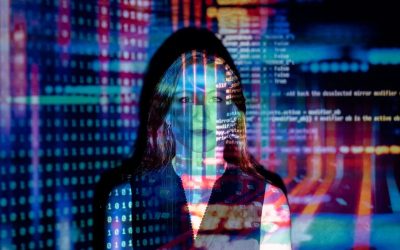Can AI Take the Place of Educators?
Significant advances in generative artificial intelligence (GAI), such as ChatGPT and others, are impacting various industries. Naturally, this has led to questions about the impact of this technology on K-12 education. Could GAI eventually replace human teachers? As experts with strong interests in both education and technology, we strongly disagree with this notion. While AI can serve as a useful supportive tool, it lacks the power to replace the various roles that teachers play in shaping the futures of young individuals.
In this article, we will delve into:
- The various spectrums of support provided by teachers.
- The personal mentorship and emotional support offered by human educators.
- The uniqueness of every student’s learning journey.
- The teaching profession is dynamic, continually growing, and improving itself.
Join us as we explain why, even with their advanced capabilities, AI technologies cannot replace the nuanced richness and profound depth of human interaction that are crucial for effective educational practices.
Various spectrums of support
Teaching goes beyond a knowledgeable educator passing information to a student. Educators take on various responsibilities that are integral to a student’s total growth. They act as:
- Mentors. Providing guidance and learning beyond the curriculum.
- Role models. Setting examples of character, work ethic, and attitude.
- Navigators. Guiding students through significant educational and socio-emotional landmarks.
Effective educators are not just instructors but also motivators, tailoring their methods to meet the unique needs and challenges of each student. Their essential human abilities are deeply rooted in empathy. This understanding of individual learning styles is something that cannot be replicated by AI or software programming. In essence, the value of human-to-human interaction in educational settings is irreplaceable. Such interactions build trust and create a caring atmosphere, setting the stage for each student’s educational success.
Mentorship and emotional support
Reflect on the most influential educators from your educational journey. Were they unique just because of the academic influence based only on the information they provided? Or did their impact spread further, deeply affecting various aspects of your life and offering long-lasting effects? These irreplaceable attributes describe what it means to be a complete educator, far beyond what any AI system can achieve.
Teachers offer:
- Holistic mentorship. They act as guides, examples to follow, and sources of emotional support, enriching not only your knowledge but also your emotional health and personality.
- Emotional safe-havens. Teachers provide environments where students can openly discuss their concerns, challenges, and goals.
- Life skills training. Educators equip students with crucial skills like effective communication, emotional regulation, and conflict resolution.
- Personalized guidance. Teachers recognize individual strengths and weaknesses, adapting their methods to meet each student’s requirements.
- Critical interventions. They frequently offer specific assistance during crucial times, influencing life paths and career choices.
Teachers prepare students for more than just academic challenges; they also qualify them for the complexities of life. Their advice extends beyond textbooks and tests to impact character development and emotional intelligence. Additionally, they foster essential interpersonal skills, qualities that AI systems are unable to instill.
Every student is unique
Teaching isn’t a “one-size-fits-all” industry. Students come with a variety of unique challenges, preferences, and learning styles in the classroom. This is especially true for younger learners and those with special educational needs.
In contrast to AI’s limitations, human educators bring a set of valuable features to the educational experience. Specifically, they offer the following key advantages:
- Adaptability. Educators are skilled in adapting their teaching methods to match each student’s unique learning style, preferences, and speed, something a machine can’t easily simulate.
- Holistic evaluation. Unlike AI systems that focus only on academic metrics, teachers can provide a complete review of a student. This includes not only their academic performance but also their emotional state, social interactions, and overall well-being.
Human educators are skilled at creating personalized strategies, from lesson planning to real-time instructional adjustments. They use their expertise in the subject matter and their understanding of human behavior to recognize and address learning differences.
Limitations of AI in education
AI technologies are skilled at managing data and following algorithms. However, they do not have the power to adapt to the unique and emotionally nuanced needs of individual students. Below are some key areas where AI lacks the nuance and flexibility that human educators offer:
- Strict compliance with algorithms. AI can’t deviate from its programmed structure, limiting its ability to adapt to individual student needs.
- Lack of emotional insight. AI systems can’t measure emotional states or understand the social circumstances affecting a student.
- Limited assessment range. Limited to data analysis, AI can’t comprehensively assess a student’s academic and emotional development.
AI is useful for specific educational tasks. However, it can’t replace the multi-layered benefits that human educators provide. Teachers are skilled not only at teaching academic knowledge but also in understanding and adapting to each student’s unique needs.
Continuous growth and personal investment
While modern AI tools may have access to extensive digital libraries and can improve through machine learning, they still fall short. Their capabilities cannot replicate the multifaceted growth and adaptability that human educators offer. Teachers are dedicated to continuous learning, which shows in several ways:
- Professional development. Regularly participating in workshops and courses to improve their skill set.
- Collaboration. Building relationships with colleagues and administrators to share lesson plans, best practices, and strategies for improvement.
- Emotional investment. Going beyond professional responsibilities to genuinely care about the well-being of their students.
- Daily adaptability. Using everyday classroom experiences to constantly improve their understanding of each student’s unique needs.
Teachers frequently think about their interactions with students. These reflections can occur during lunch breaks or quiet moments at home. As the academic year progresses, they adjust their teaching methods based on a growing understanding of each student’s needs. Such a level of personalized focus and emotional investment cannot be replicated by any AI or software system.
Final thoughts
While artificial intelligence provides valuable tools for enhancing K-12 education, it cannot take the place of human educators. Teachers offer a unique combination of academic instruction, emotional support, and life skills training, tailored to meet the individual needs of each student. They continuously adapt, collaborate with peers, and extend their professional responsibilities to genuinely invest in their students’ well-being. Although AI excels in data management and algorithmic tasks, it lacks the emotional intelligence and adaptability crucial for effective teaching. Therefore, the human element in education remains irreplaceable. Teachers will continue to play an essential role in the growth and development of both current and future generations. So to all educators out there: keep learning, growing, and doing what you do, because this generation and those to come to depend on you.



